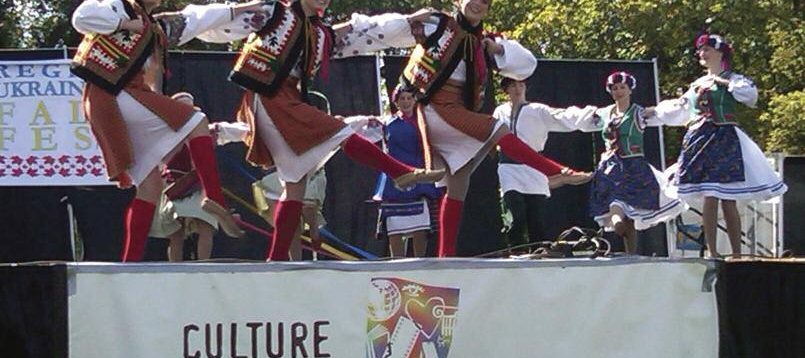Ukrainian cultural identity deeply rooted in province

Related Programs

The Ukrainian culture runs deep throughout Saskatchewan. Hearing the language spoken, eating the traditional dishes or seeing the brightly coloured national dress, is common in many areas of the province and has become, for many, part of Saskatchewan’s shared culture. Today, those of Ukrainian heritage might define themselves as part of a thriving cultural community that encourages belonging, preservation and development of the language and traditions, a strong political will, and an interest, if not a love, of Ukrainian arts, including dance, music, film and literature.
“Over 120 years ago, Ukrainians arrived and helped build this province,” explains Danylo Puderak, executive director of the Ukrainian Canadian Congress - Saskatchewan Provincial Council, Inc. “Our members are still nation builders today. By preserving and growing the Ukrainian Canadian culture, identity and aspirations in the province, we have been able to develop strong communities with much civic pride, support for provincial immigration efforts and add to Saskatchewan’s vibrant multicultural identity.”
Although there are many different Ukrainian cultural organizations in Saskatchewan, the Ukrainian Canadian Congress - Saskatchewan Provincial Council (UCC-SPC), remains the central hub for connecting the interests of the Ukrainian cultural identity in the province. Since the early ‘70s, the provincial organization has been a leader in working with its partners to develop programs and services to support and develop the Ukrainian culture in the province, such as the establishment of the Canada-Ukraine Centre and the Prairie Centre for the Study of Ukrainian Heritage.
“In 2009, UCC-SPC supported the first International Festival of Ukrainian Cinema in Saskatchewan,” explains Puderak. Through a partnership between UCC-SPC, the Embassy of Ukraine in Ottawa and the Ministry of Culture in Ukraine, a series of English-subtitled Ukrainian films were brought from the Ukraine to Saskatoon and Regina for screenings. “Held over three days, the films were screened at the Broadway Theatre, along with a special Friday matinee of children’s films sponsored by SaskCulture,” adds Puderak. “Over 300 students from local schools were invited to enjoy this unique cultural experience.”
Over the years, the focus on cultural preservation has been important to the Ukrainians in Saskatchewan. “Before Ukraine gained its independence in 1991, Ukrainians in the province were particularly focused on the preservation of language and culture,” explains Puderak. “Now, an independent Ukraine is in control of its own culture and immigrants to Canada bring with them a more contemporary culture. The traditions are still there, but their cultural expression represents a more modern society.”
While dance, in particular, has seen a dramatic shift with the inclusion of new contemporary Ukrainian dance styles, the inclusion of the traditional Ukrainian folk dance continues. There are more than 40 Ukrainian dance schools located throughout the province, which train dancers at many different levels for performance and competitions. “The influence of the many Ukraine-trained choreographers- instructors has refined many of the traditional dances to reflect more of a stage-style, while incorporating and creating new contemporary pieces,” says Puderak. “In addition, the quality of the dancers is reflected by the fact that many of our dancers are invited overseas for performance tours. This has included Ukraine, Brazil, the USA, England, to name a few.”
Besides preserving and developing Ukrainian dance, the community is also supportive of maintaining the Ukrainian language in the province. Bishop Filevich Ukrainian Bilingual School located in Saskatoon, is the only full-time bilingual school in the province devoted to teaching Ukrainian language and culture, while Miller High School and Athabasca Elementary School in Regina offer Ukrainian language classes as credit courses. Others can access Ukrainian language courses as online credit courses through the Saskatchewan Distance Learning Course Repository(www.skdistancelearning.ca), though summer immersion camps and many Ukrainian pre-school programs, called a “sadochok”, are offered around the province. “Ukrainian is still spoken in many homes and with children and older relatives,” says Puderak. “And continued immigration from Ukraine to Canada keeps the language skills relevant for social and professional reasons.”
Over the past decade, the UCC-SPC has continued to work with government to provide settlement services to immigrants, mainly from Ukraine, in Saskatchewan. UCC-SPC and its branches in Regina and Saskatoon have five staff members dedicated to providing settlement- related services.
Through programs such as the Provincial 50-50 Lottery, and the popular National Builders and Community Recognition Awards, the UCC-SPC continues to inspire volunteerism and community development inside the province, as well as make its mark on the international scene. In 2008, the UCC-SPC, along with its partners, were successful in gaining national recognition of the tragedy of Holodomor, where a Soviet engineered famine ended the lives of millions of Ukrainian people between 1932 and 1933. That year the province of Saskatchewan became the first Canadian jurisdiction to recognize the Holodomor as Genocide and now recognizes Ukrainian Famine and Genocide (Holodomor) Memorial Day - the fourth Saturday of each November.
The experience serves as a reminder of how culture and identity can endure even a genocide, and serve to strengthen society as a whole.
The UCC-SPC continues to explore new avenues to share Saskatchewan’s Ukrainian cultural identity with the wider community. “Our Ukrainian community is currently seeing a generational shift,” explains Puderak, “We are working to engage younger people in our organizational structures to help the renewal and bring a new enthusiasm to our organizations.” UCC-SPC receives operational Engage Spring 2011 5 Besides preserving and developing Ukrainian dance, the community is also supportive of maintaining the Ukrainian language in the province. ( ( funding from the Saskatchewan Lotteries Trust Fund for Sport, Culture and Recreation. Thanks to this funding, it is able to continue providing programs and services that support community building in many different ways.
For more information on Ukrainian culture in Saskatchewan, visit the UCC-SPC web site at www.ucc.sk.ca .

